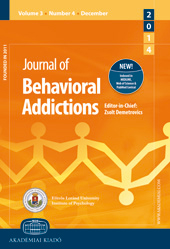Down and Out in London: Addictive Behaviors in Homelessness
Down and Out in London: Addictive Behaviors in Homelessness
Author(s): Steve Sharman, Jenny Dreyer, Luke Clark, Henrieta Bowden-JonesSubject(s): Cognitive Psychology, Behaviorism, Social differentiation, Substance abuse and addiction, Family and social welfare
Published by: Akadémiai Kiadó
Keywords: gambling; homelessness; alcohol; substance abuse; vulnerable;
Summary/Abstract: Problem gambling occurs at higher levels in the homeless than the general population. Past work has not established the extent to which problem gambling is a cause or consequence of homelessness. This study sought to replicate recent observations of elevated rates of problem gambling in a British homeless sample, and extend that finding by characterizing (a) the temporal sequencing of the effect, (b) relationships with drug and alcohol misuse, and (c) awareness and access of treatment services for gambling by the homeless. Methods: We recruited 72 participants from homeless centers in Westminster, London, and used the Problem Gambling Severity Index to assess gambling involvement, as well as DSM-IV criteria for substance and alcohol use disorders. A life-events scale was administered to establish the temporal ordering of problem gambling and homelessness. Results: Problem gambling was evident in 23.6% of the sample. In participants who endorsed any gambling symptomatology, the majority were categorized as problem gamblers. Within those problem gamblers, 82.4% indicated that gambling preceded their homelessness. Participants displayed high rates of substance (31.9%) and alcohol dependence (23.6%); these were not correlated with PGSI scores. Awareness of treatment for gambling was significantly lower than for substance and alcohol use disorders, and actual access of gambling support was minimal. Discussion and conclusions: Problem gambling is an under-recognized health issue in the homeless. Our observation that gambling typically precedes homelessness strengthens its role as a causal factor. Despite the elevated prevalence rates, awareness and utilization of gambling support opportunities were low compared with services for substance use disorders.
Journal: Journal of Behavioral Addictions
- Issue Year: 5/2016
- Issue No: 2
- Page Range: 318-331
- Page Count: 7
- Language: English

